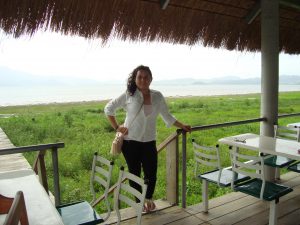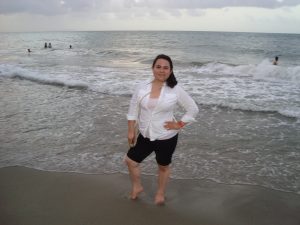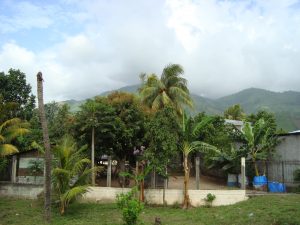
Skarlet is a bona fide “triple dog “at the University of Georgia. After earning her bachelor’s in business administration, she obtained her master’s degree in public health with a concentration in health policy and management. Skarlet has commenced working on her PhD. At this point, she has nearly completed her first year of studies in Epidemiology and Biostatistics and wishes to apply her skills to the field of child and maternal health.
After Skarlet’s mother married her step-father, a serviceman in the military, an eight year old Skarlet and her mother relocated directly to Augusta, Georgia from Tegucigalpa, the capital of Honduras. From what she can recall and her mother tells her, she was not very enthusiastic about coming to Augusta because everything she knew was in Honduras.
For Skarlet, the biggest change revolved around learning a new language. She was enrolled at Glenn Hills Elementary because it was the only school in the area that featured an “English as a Second Language” program. Skarlet realizes that being young was an advantage because she was able to acclimate to her surroundings. According to her mother, Skarlet was speaking English in about four months, but she remembers the process of learning English made her first few months in the program arduous.
Fearful that she would forget Spanish after coming here, Skarlet’s mother firmly held on to their language and traditions. In their home, the Spanish broadcast net work, Univison, was always on. “Everything was Spanish all the time,” (4:52) she remarked. Her mother’s commitment to the language was so strong that, in a way, “she sacrificed herself [from] learning more English” (4:46) so that Skarlet would not lose this part of her. Another custom she held on to revolved around the way people greeted each other Latino culture. Exchanges typically come with a hug or a kiss on the cheek, and this is common across Latin-American cultures. Skarlet recalls how surprised her mother was at the way greetings here seemed cold and impersonal, as opposed to the ones she was accustomed to—her mother made sure that gestures like this were not lost.
However, not every change was unwelcomed; access to educational opportunities and overall security are two benefits both her and her mother have recognized because of their migration. She notes how her mother would comment on how “very quiet [and] very safe” (14:01) it feels here. And when Skarlet visits home, she is mindful of her attire: where your phone is, “the earrings you wear [and] the clothes you wear” (14:48) are things you stay cognizant of because of the crime and gang issues there.


In Skarlet’s case, “there is a cultural shock” (14:19) when she visits family in Honduras. Skarlet stated in particular that when she returns to Honduras, the people in the community have a tendency to view her differently. First and foremost, people assume she is rich; her interactions and attitudes are often misconstrued. She is viewed by others with an air of elite-ness because of the way she might dress. Even when Skarlet speaks in Spanish, people suggest she is not from there because it does not conform to the local vernacular or accent. She recalls a particular event in a taxi when she the driver suggested that she was not from Honduras, to which she replied, “yeah, I’m from Guatemala.” (18:34)
As far as things back home, she realizes that Augusta is growing and changing, but that unlike Athens or other college towns, Latino culture is still not entirely visible across the area. And this lack of visibility can often alienate members of the community in increasingly detrimental ways. As a former board member and volunteer for the Association of Latina Services in the CSRA, a public health initiative that serves uninsured patients below the poverty line through the Clinica Latina, she recalls moments where there was a disconnect between the community and the organization. As a volunteer, many people would not have known anything about the organization despite outreach efforts; furthermore, members of the community were hesitant and fearful of reaching out because it may jeopardize them—Skarlet recalls that people would constantly ask “do we need to show papers?” (39:22) She suggests that outreach programs are much more visible and in places like Athens, and while events like the annual Spanish festival in Augusta feature tents from outreach organizations, in this context, it is still a challenge to spread information about the services organizations like the clinic provides. Overall, there is an inherent distrust in the community that is exacerbated by the national political climate, and a lack of representation in local government. Skarlet notes that education geared toward younger people and openness from the city government are two aspects that, if improved, would greatly benefit the community. Above all, she maintains that the clinic is a safe-space for those who need it, and that “people need to know that its okay…you can come out here and people want to help you.” (46:38)